Monks’ eviction from Long Beach Cambodian Buddhist temple riles congregation
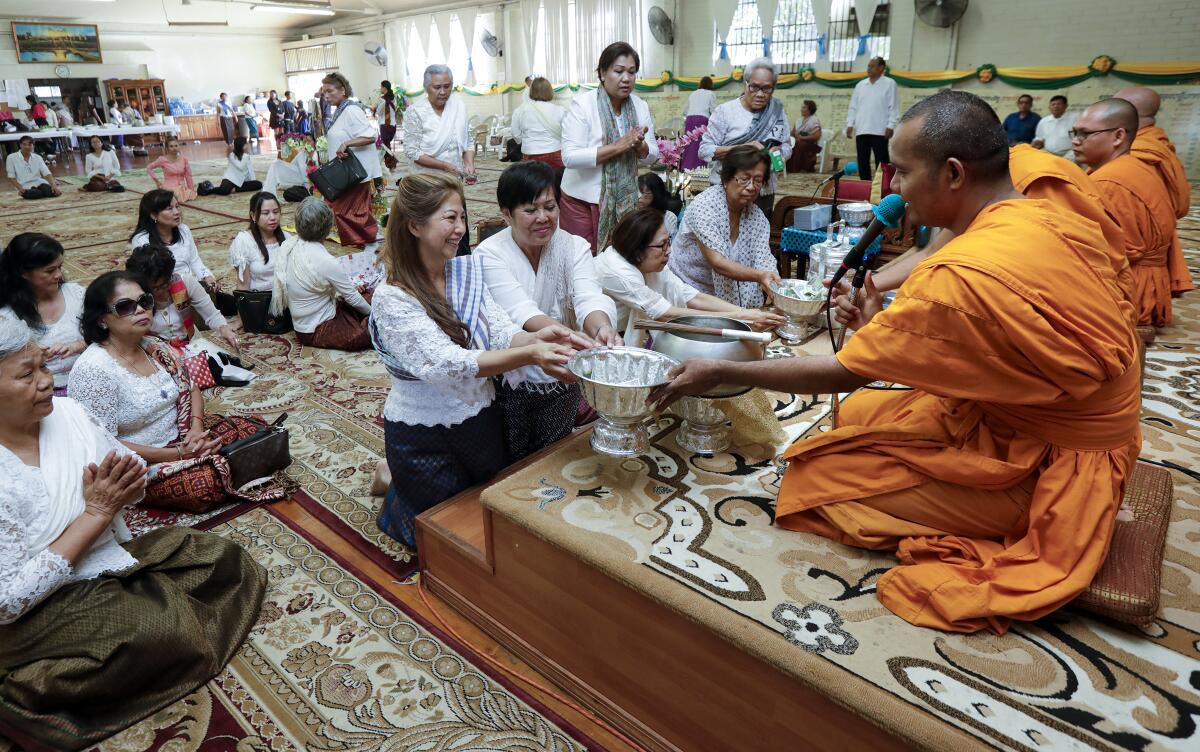
- Share via
Until a few weeks ago, the monks at the largest Cambodian Buddhist temple in Long Beach followed a daily worship rhythm dating back thousands of years.
Waking at dawn, they sank into meditation, chanting, sharing prayers and giving thanks for bowls of steaming rice porridge prepared by a stream of visiting volunteers.
In a routine based on the rising and setting of the sun, beneath the roof of the decaying Khemara Buddhikarama near the city’s industrial west side, the four religious leaders focused on ministering to their congregation with a spiritual message transmitted across four generations of immigrant families.
But as October draws to a close, these calm, soft-spoken men are struggling with a more pressing problem: eviction.
Since last summer, a majority of the temple’s board of directors had been threatening to force the monks out. A main issue in the dispute involves the fate of more than $300,000 in donations, some collected during special ceremonies, that the 19-member board has earmarked for building a second pagoda.
The monks have hundreds of supporters among the congregation, which numbers over 1,000. Several members say that they’ve demanded to see a blueprint of remodeling plans and the city permit for the project but have been stonewalled by the board.
Some worshipers — including longtime supporters who pooled tens of thousands of dollars of their own money to help buy the land and build the Khemara Buddhikarama decades ago — allege that some board members are consolidating power and not holding themselves accountable to the people.
The head monk, the Venerable Thet Sim, 45, said that board leaders would not allocate money for much-needed repairs at the temple, yet pressured him to push for more member donations to build the second pagoda. He refused, and he believes that as punishment the board sued to evict him and assistant monk Tith Bun, 32. A lawyer for the board has refuted those allegations.
The eviction case went to trial in September and the board members won. Sim and Bun are appealing the ruling, according to Tim Milner, a lawyer representing them.
Meanwhile, the board moved quickly after winning the case. Some board members, accompanied by officials from the Los Angeles County Sheriff’s Department, showed up at the temple on Oct. 15 to evacuate it, locking the doors and declaring that it would remain closed for at least 10 days for cleaning, according to witnesses.
While the temple remains shut, the monks are bunking down in old cars parked outside the temple gates, with loyal worshipers setting up tents to help guard them around the clock. Long Beach police have said that the temporary camp can remain as long as participants are peaceful and do not trespass.
“This is the type of case that should have been worked out privately,” Milner said. “This is a religion of peace. These are men of peace.”
Tracy Guerra, an attorney representing board members, responding to questions by email, noted that at the eviction trial the monks alleged that the board was pushing them out in retaliation for three things.
The monks, according to Guerra, alleged that board members were doing something illegal and/or fraudulent and had asked them to go along with it, which they refused to do. Guerra said the monks also claimed that the board wanted to evict them because the monks were requesting repairs to the temple, and the board didn’t want to do the repairs. Third, he said, the monks alleged that board members wanted to evict them because they were exercising their right to free speech, and the board didn’t like that.
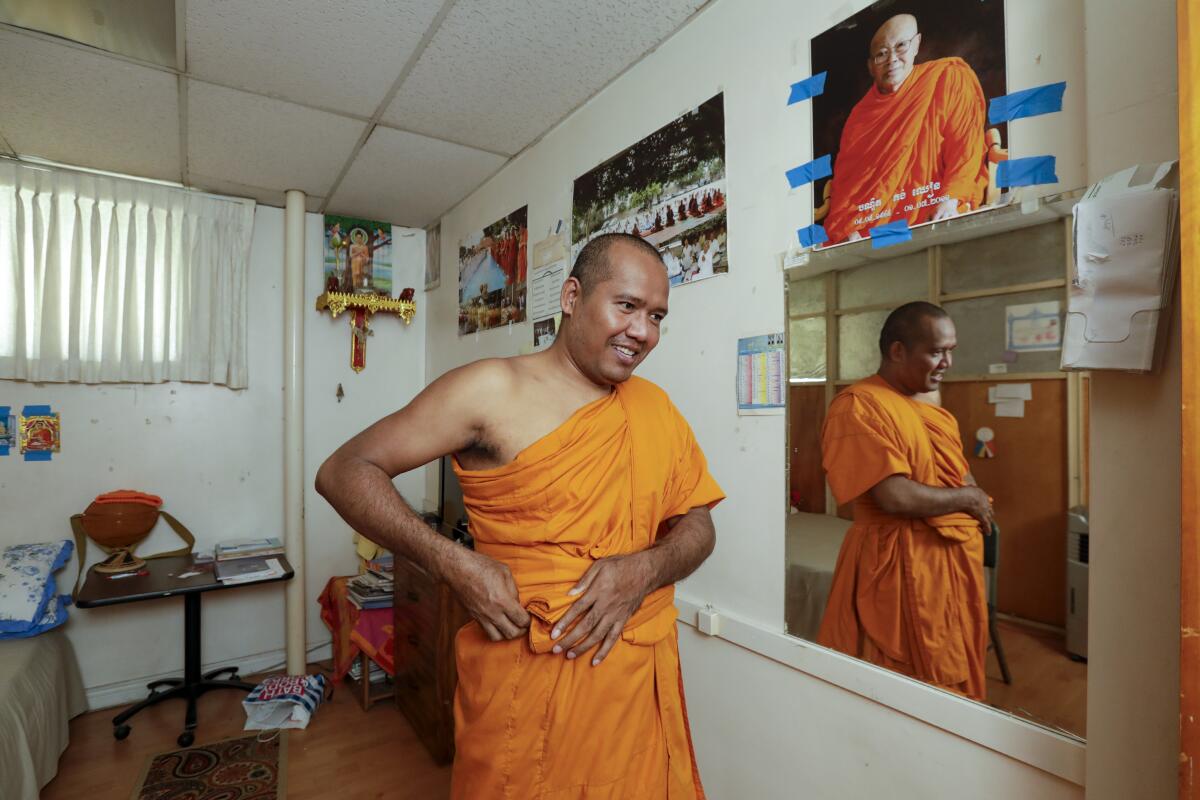
The jury found that all three of those allegations were false, Guerra said.
Some details about the trial remain unclear. The proceedings, according to Milner, were recorded, and he has requested that a transcript be made.
Guerra says that once the formal eviction is completed, the board plans to renovate the temple as soon as possible and then “hire a new head monk right away.”
“Both of these events should help this temple to heal from the recent division,” Guerra said.
The temple has deteriorated over the years. Cracks line the ceiling and walls. The roof leaks in the rain. The men’s bathroom is in need of an overhaul.
The monks say they increasingly had been pressed into doing manual labor. Lacking funding for urgent repairs, they appealed to the congregation, raising money for supplies to fix the flooring and plumbing in the women’s bathroom. Rolling up their saffron robes, they handled drains, toilets and valves.
Board member Kimthai Kuoch, in his testimony against the monks at trial, concurred that the temple and other buildings “contained serious defects including a leaking roof” as well as “dangerous electrical wiring.” But he asserted that this was OK because it was “in a room no one uses,” according to a memo from Andrew Cooledge, an attorney who represented the monks before their appeal.
The temple is often called Wat Willow to denote its location along Willow Street. The Rev. Kong Chhean, a monk with a doctorate in clinical psychology who fled the Khmer Rouge in his native Cambodia and came to the United States in 1979, set up an informal place of worship first in Hawaiian Gardens, then in Lakewood, before moving to the current site in 1990.
Wat Willow thrived under his leadership, with the beloved abbot nurturing ties across generations. The temple became a corporation with bylaws in 1991.
After Chhean’s death in 2011, a faction of the board changed the bylaws without allowing the congregation to vote, according to several members. The revision left the board in power and, currently, “there are no checks and balances involving any money collected,” said Paul Nhep, a Long Beach resident and congregation member who brought a grill to barbecue chicken next to the sidewalk to feed the campers and monks.
“If there’s wrongdoing,” Nhep said, “where’s the evidence?”
Many in the congregation say they are devastated by the recent turn of events.
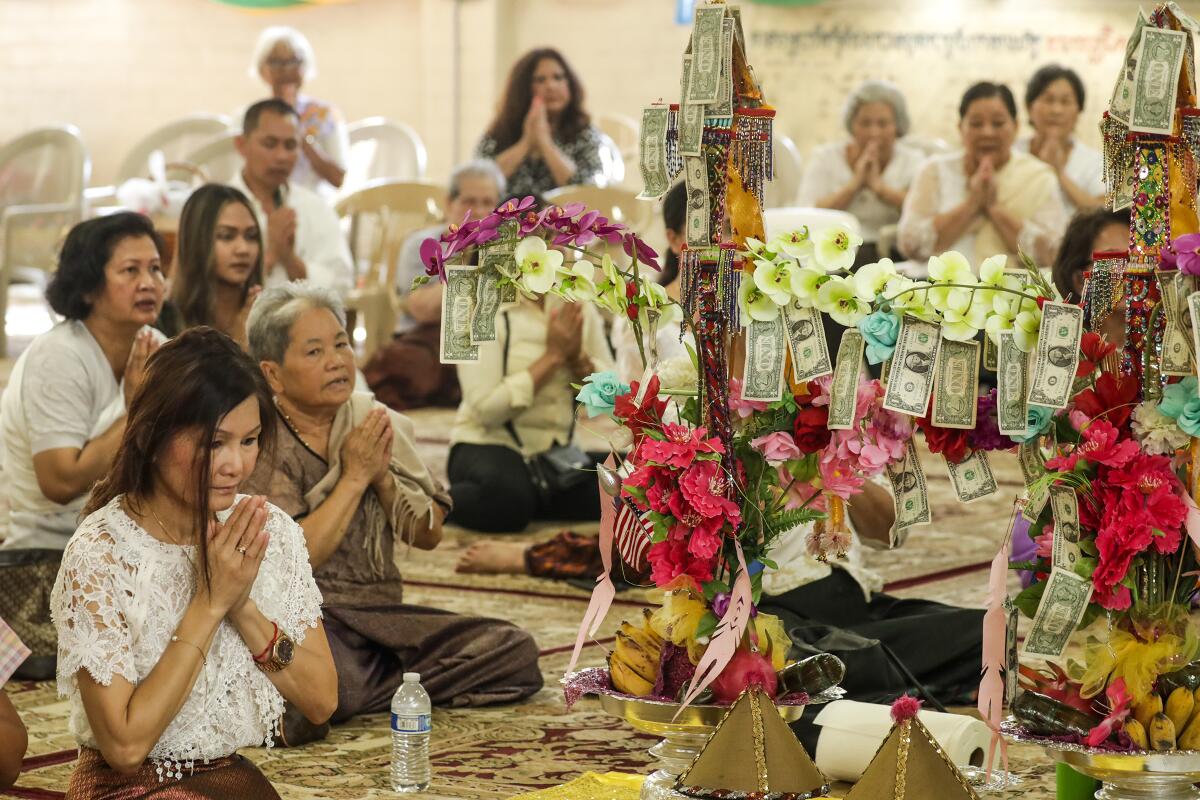
Oni Vitandham, a Burbank resident who lived at Khemara Buddhikarama for a year as a teenage orphan, more than three decades ago, said that evicting the monks would be “a crime against humanity.”
“The temple is a shelter where we welcome everybody, where we try to provide for everybody,” Vitandham said. “We cannot lose the monks. The board has tried to use them as their piggy bank. What will happen to them? Can you believe that they’re now sleeping in their cars? This is injustice.”
Polyana Heng, 20, and cousin Ashley Ngor, 23, said they valued going to services at the same temple where their great-grandmothers “came to find community and to heal after everything that happened to them in Cambodia” during the Khmer Rouge’s genocidal capaign of the 1970s.
Through the years, the monks “are at the core of this community,” Heng added. “It does not make sense for them to leave.”
Head monk Sim said he was “more worried for the temple’s members” than for himself.
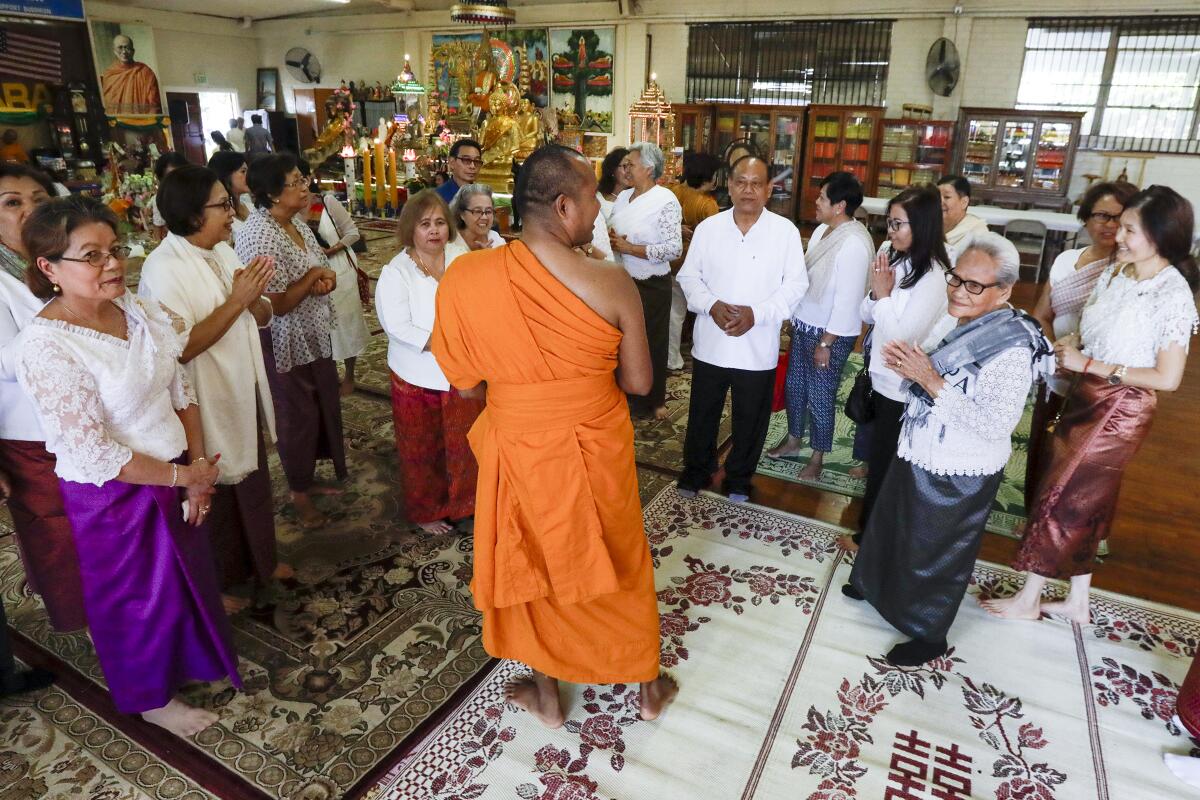
“It’s very meaningful that we have people who care,” Sim said. “There is no conflict among us.”
“We work together like a brotherhood,” Bun added. “The members are our family.”
Elizabeth Tinsley, an assistant professor in UC Irvine’s East Asian Studies department who has researched Buddhism, heard about the crisis and visited the temple twice.
Tinsley said that, although eviction was a legal reality, it’s also largely irrelevant because the monks’ Buddhist precepts prohibit them from owning personal property; in any situation, they must rely on donations.
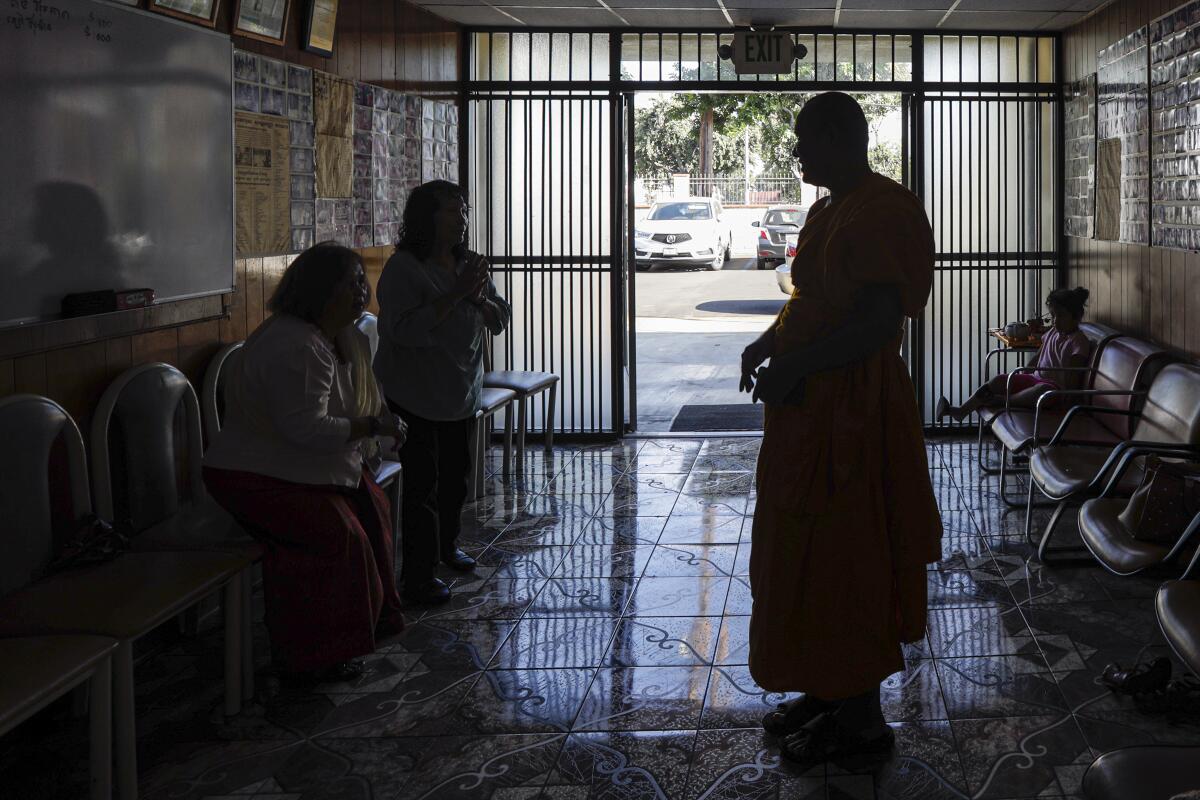
“The community is there to support them because we need pure and monastically trained figures in our world to perform rituals for us,” Tinsley added.
What struck her most, she said, was the loyalty of the temple’s members, who pooled their resources to build a house of worship after fleeing Pol Pot’s murderous regime in their homeland.
“It is a nasty irony that their own board of directors is trying to evict the residential monks,” she said. “Hasn’t this community experienced enough exile?”
More to Read
Sign up for Essential California
The most important California stories and recommendations in your inbox every morning.
You may occasionally receive promotional content from the Los Angeles Times.











